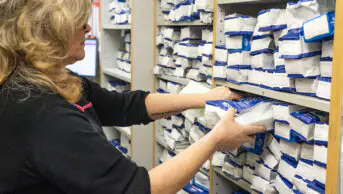
Royal Pharmaceutical Society
Delegates at the 2022 Royal Pharmaceutical Society (RPS) annual general meeting (AGM), held on 25 May 2022, voted by a narrow margin in support of a motion for the RPS to become a royal college.
The motion, proposed by former RPS president Steve Churton, called upon the RPS Assembly to “reaffirm this commitment [to seek royal college status] and to further commit to a timeframe in which it expects the Society to become a royal college of equivalent status to those recognised by the Academy of Medical Royal Colleges”.
In March 2022, the RPS announced that it had taken the decision not to pursue royal college status as part of its strategic plan until 2026.
However, Churton said this would be a mistake to “underestimate the strategic advantage that being a royal college would provide”.
Speaking in the AGM prior to the member vote on the motion, Alisdair Jones, a member of the RPS English Pharmacy Board, said: “I recognise there is a potential status argument and that is not to be dismissed, but people I have spoken to haven’t been able to give me good example of something we could only do if we became a royal college.”
Raliat Onatade, group chief pharmacist and clinical director for medicines optimisation at Barts Health NHS Trust, said in the AGM discussion that she disagrees that becoming a royal college would be “just a name change”.
“[Becoming a royal college] signals attitude and ability to influence policy. It also means we are holding ourselves to account. When the RPS was being formed, there was encouragement for people to join as [the Society] would become a royal college… Some [members] were disappointed when the commitment was quietly dropped.”
The poll on the motion revealed that 51% of 152 eligible members attending voted in support of the motion, while 30% voted against and 19% abstained.
In an article published in The Pharmaceutical Journal on 22 April 2022, Paul Bennett, chief executive of the RPS, outlined why the Society would not become a royal college in the immediate future.
“The RPS Assembly decided that the Society should put its efforts into delivering the seven strategic goals agreed in the current strategy rather than put time, effort and financial commitment into converting to a royal college, but it has not ruled that prospect out in the development of any future strategy,” he said.
Motions passed at the AGM are not binding, but will be considered in open business by the RPS Assembly at its July 2022 meeting.
Other motions passed at the RPS AGM
Mohammed Hussain, senior clinical lead at NHS Digital and a trustee of the charity Pharmacist Support, received overwhelming support for his proposed motion for the RPS to donate a minimum of £1 per member, per year, to the charity. A poll of members present showed 94% voted in support, while 3% voted against and 3% abstained.
Hussain proposed a further motion proposing that “a public and independent review of the RPS governance structures should be undertaken, with the final report and responses from the Assembly published in open business”. Hussain said this would include the frequency and format of meetings, which was supported with 81% in favour, while 9% voted against and 10% abstained.
Malcolm Brown, retired pharmacist and author, proposed that the Society should reconsider its decision to leave the International Pharmaceutical Federation (FIP) and seek to re-join, which was agreed by a vote of 92% for, while 4% voted against and 4% abstained.
Matthew Tennyson, locum pharmacist and member of the Pharmacists Defence Association (PDA) Union North England Regional Committee, proposed a motion that members should be able to vote on Assembly decisions; for which 69% voted in favour, 20% voted against and 12% abstained.
Nahim Khan, a pharmacist working across general practice, community and academia, proposed a motion to “increase the transparency of RPS meetings and decisions”, which included the recording of meetings so that they could be viewed by members later. The motion also proposed that votes on Assembly and Board meetings should be recorded against individuals. This motion passed with 89% in favour, 5% against and 6% abstaining.
1 comment
You must be logged in to post a comment.



50% for and 30% against is a narrow majority. Really??